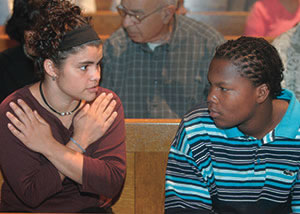Asking for a Blessing instead of Communion
"I recommend that, at times, you attend Mass yet do not take communion."
This is an odd recommendation from a Catholic priest. The Church has devoted much effort to promoting the reception of the Eucharist. In 1905 Pope St Pius X issued a decree “On Frequent and Daily Reception of Holy Communion” in which he asserted “the faithful who are present should communicate, not only in spiritual desire, but sacramentally, by the actual reception of the Eucharist.” Vatican II picked up the theme “Mother Church earnestly desires that all the faithful should be led to that full, conscious, and active participation in liturgical celebrations which is demanded by the very nature of the liturgy” (SC 14) and encouraged “taking part in the eucharistic sacrifice, the source and summit of the Christian life” (LG 11) The Catechism of the Catholic Church states that “the Church strongly encourages the faithful to receive the holy Eucharist on Sundays and feast days, or more often still, even daily.”
I was taught in the seminary that the Eucharist is food, and that the best response to this gift is the reverent eating of it. We were reminded of the words of Jesus in the Gospel of John “For My flesh is true food, and My blood is true drink. He who eats My flesh and drinks My blood abides in Me, and I in him.” (6:55-6)
All of this was part of a big shift in Catholic practice. In the nineteenth Century because of the scrupulous ideas of Jansenism the norm of Catholic piety was to attend mass frequently but without receiving communion. Early in the twentieth century in New Zealand it was not unusual to have a Sunday Mass in which none of the congregation took communion. Part of fulfilling one’s “Easter duty” as a Catholic is to take communion during Lent or Eastertide. For some Catholics because of their reverence for the sacrament and their consciousness of their own sinfulness this was the only time during the year that they received.
My impression is that papal and conciliar teaching has been effective and completely changed the habits of churchgoers. The norm for mass-attenders today is to take communion every time. Whole congregations come forward to receive, sometimes organised on a pew-by-pew basis. It can be hard to not go forward at communion time.
The same is not true for the Sacrament of Reconciliation. That sacrament is considerably less well-attended than it was in years past.
My fear is that by linking mass-attendance and communion-going so strongly we are making it difficult for people to come to mass and not to take communion. There can be many reasons to choose to do this: non-Catholics attending with their partner, Catechumens, children who have not made first communion, those who ate something just before mass, people who judge themselves as unready to receive.
A wonderful practise has appeared in New Zealand and elsewhere, perhaps emerging from the Catholic schools (where they have school masses with many non-Catholics in attendance). It involves signalling to the minister of communion that you wish to receive a blessing rather than the host. The usual signal is one or both hands across your chest. In response the minister will stretch out their empty hand and say a short prayer. 
The Auckland Diocesan Liturgy Office encourages that the prayer be extremely short eg. “May the Lord bless you. Amen” or “May the Love of God be in your heart. Amen” or “May Father, Son and Holy Spirit bless you. Amen.” The idea being that it should not take longer than receiving communion, and that it be formal and ritual rather than conversational and improvised.
I consider the opportunity of a blessing at this time wonderful because of the hospitality it extends to regular non-communicants and because of the freedom it gives to those who normally take communion. It enables them to make a choice without a public fuss. This allows the sanctity of the eucharist and the frailty of the human condition to be respected.
Let St Paul have the last word: “Whoever, therefore, eats the bread or drinks the cup of the Lord in an unworthy manner will be guilty of profaning the body and blood of the Lord. Let a person examine their self, and so eat of the bread and drink of the cup.” (1Cor 11:27-28)

 Entries(RSS)
Entries(RSS)